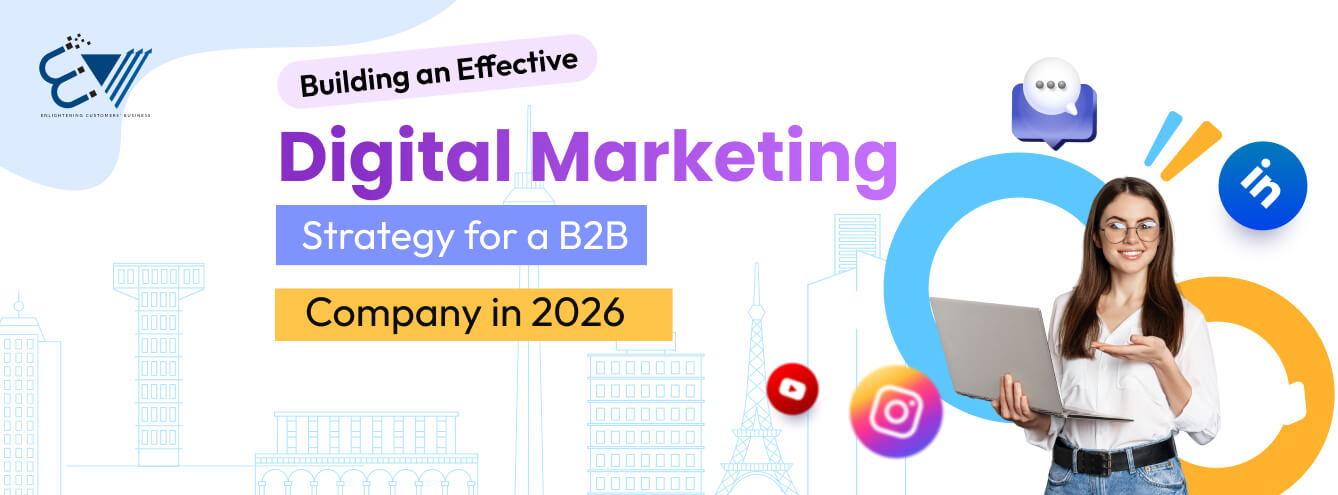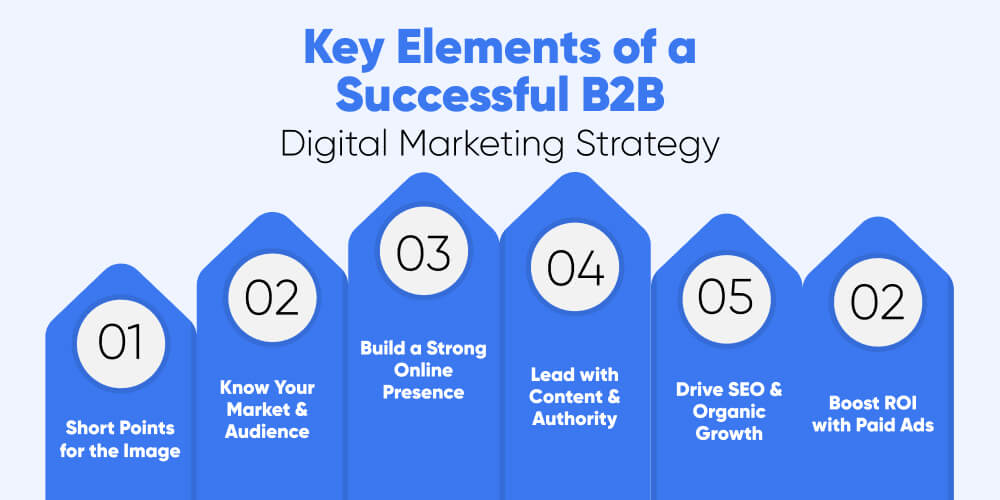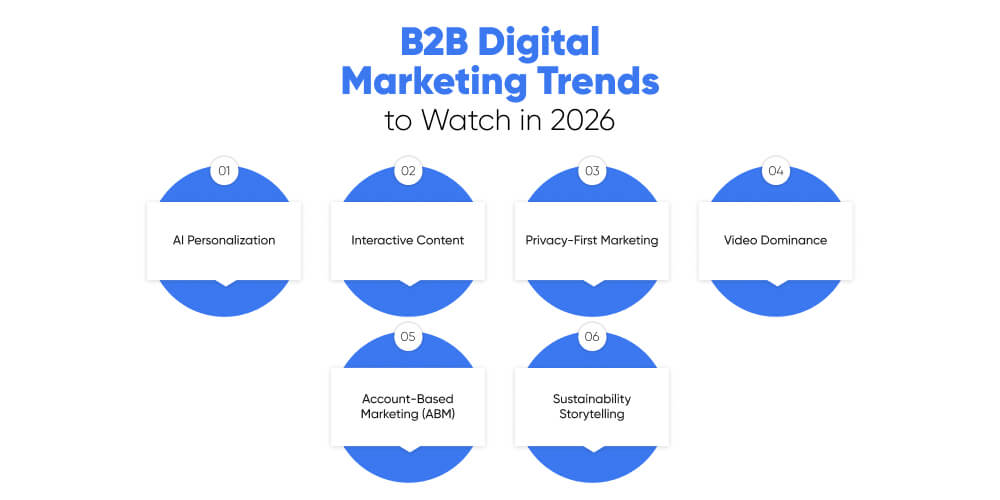Building an Effective Digital Marketing Strategy for a B2B Company in 2026

 11 min
11 min
Imagine the present B2B market: it looks calm on the outside, yet there is a constant flow of rivalry underneath. People used to make decisions via handshakes. Now they do it through LinkedIn and search engines. In this day and age, a company's internet approach is like its handshake, its pitch, and its reputation all in one. That’s why building a digital marketing strategy for a B2B company is not simply an option in 2026; it’s a matter of endurance.
Today's B2B buyer is a new type of person: smart, doubtful, and always looking for the best deal. They don't wait for someone to reach out to them; they perform their study in secret, narrowing down their options before talking to a salesperson. The company that gets their attention early and keeps it with authority and relevance wins. A sound digital strategy achieves exactly that: it replaces cold calls with credibility and advertising noise with insight.
An effective digital marketing strategy for a B2B company doesn’t rely on trends; it’s built on understanding how real people—executives, procurement teams, and decision-makers—behave online. It’s less about shouting and more about showing: showing expertise, consistency, and trust. In the years ahead, those three qualities will define not only who gets found, but also who gets chosen.
Why a Strong Digital Marketing Strategy Matters for B2B Companies
The era of casual marketing in B2B is over. Every interaction now leaves a digital footprint—a data trail that reveals intent, interest, and opportunity. A well-built digital marketing strategy for a B2B company converts that data into direction, helping businesses target precisely, engage meaningfully, and measure what truly matters.
A strong strategy matters because the buying process has changed faster than most companies have adapted. Business decisions unfold across multiple screens and weeks of research. A chief technology officer may read your case study at midnight; a procurement team may bookmark your pricing page weeks later. Without a cohesive digital plan connecting those touchpoints, opportunities slip quietly away.
Moreover, visibility has become the new credibility. The businesses that appear consistently in search results, social discussions, and professional networks earn trust before a single conversation begins. That trust, once digital, translates directly into real contracts and long-term partnerships.
In short, the strength of your digital marketing strategy for a B2B company determines whether your brand whispers or resonates. In 2026, resonance wins.
Is Your Current Strategy Future-Ready?
Find out if your digital marketing approach aligns with 2026 buyer behavior and technology shifts.
Audit My Strategy
Key Elements of a Successful Digital Marketing Strategy for a B2B Company

It's not enough to just make a list of marketing strategies for a B2B company. You need to build a system that links data, psychology, and timing. Every decision-maker your company wants to reach is a real person who has to deal with a lot of noise in the digital world. You need to cut through all that noise with your plan, talk directly to their problems, and show that you can be trusted before you even meet.
The foundation of success lies in five essential elements: profound market research, a strong online presence, insightful content, organic authority, and measurable advertising. Each one plays a distinct role, but together, they create a marketing engine that keeps delivering qualified leads and meaningful engagement long after a campaign ends.
Conducting Market and Audience Research
Listening, not broadcasting, is the first step in any good approach. Market and audience research can tell you not just who your customers are, but also why they buy, how they look for things, and what they don't want to miss out on.
This phase is not optional for a B2B company's digital marketing plan. B2B decisions are rarely made on the spur of the moment; they are usually well thought out and made by a group. Good research goes into three levels:
- Industry trends: Understanding the shifting priorities that influence your clients’ budgets.
- Competitor mapping: Identifying where others rank, what messages they use, and where their blind spots lie.
- Buyer personas: Defining the real people behind the purchase orders: their goals, their frustrations, and the digital spaces they trust.
In short, strategy without research is marketing on guesswork, and in B2B, guesswork is expensive.
Building a Powerful Online Presence
Your website is no longer a brochure; it’s your first sales conversation. It has to work harder, faster, and smarter than ever. A modern digital marketing strategy for a B2B company starts with a website that speaks both to search engines and to humans with clean design, fast loading speed, and messaging that instantly communicates expertise.
Beyond the website, online presence extends to professional networks, review platforms, and digital PR. Every touchpoint, from your LinkedIn activity to your case study design contributes to a single impression: Is this a company I can trust with my business? The answer should be immediate and affirmative.
A powerful online presence is built on clarity, not clutter. It positions your brand as the obvious choice in a crowded field.
Leveraging Content Marketing and Thought Leadership
In B2B, content is not filler; it’s currency. Executives and decision-makers use content to educate themselves before they ever contact a vendor. That means the company that teaches best wins first.
A compelling digital marketing strategy for a B2B company uses content to build thought leadership, not just visibility. White papers, case studies, research reports, and webinars show that you are an expert. Blogs and opinion articles make experts seem more human. The goal is not to sound smart; it’s to be useful.
Great content answers questions that people don't ask and makes readers think you know more about their field than anyone else. Conversions come naturally when you earn people's confidence by teaching them.
Driving SEO and Organic Growth
Organic growth remains the backbone of digital credibility. SEO, when done strategically, doesn’t just attract visitors; it attracts the right visitors. For B2B businesses, being at the top of the search results for relevant keywords might mean getting a consistent stream of leads for months without having to pay more on ads.
The issue is being exact. A B2B company's smart digital marketing campaign selects keywords based on what people want, makes the site work better, and builds authoritative backlinks. It places good content that truly helps readers ahead of keyword stuffing, which is a way to fool algorithms.
SEO is less about tricking search engines and more about working with them in 2026. Google promotes expertise, dependability, and a positive user experience, which is exactly what good B2B businesses do now.
Maximizing Paid Advertising and Retargeting ROI
Paid advertising is where data meets decisiveness. It allows you to reach specific audiences quickly and track every dollar spent. But for B2B, success isn’t measured in clicks; it’s measured in conversions, conversations, and contracts.
A smart digital marketing strategy for a B2B company uses sponsored ads to help organic growth, not replace it. LinkedIn Ads, Google Ads, and networks that are particular to your industry are all great ways to reach decision-makers. Retargeting makes sure that those who were interested in your brand once keep seeing it until they are ready to act.
The goal isn’t more impressions; it’s more impact. Each campaign should be improved, tested, and optimized until it gives you measurable ROI instead of just vanity metrics.
Emerging B2B Digital Marketing Trends to Watch in 2026

In 2026, the B2B digital world is always changing, where automation meets authenticity and technology meets trust. Companies that change early will have a big impact on the future. Here are the trends that are shaping that change:
- AI-powered personalization: With AI, marketers can now talk directly to each customer's requirements by customizing their experiences in real time, from email content to product recommendations.
- Interactive and experiential content: Instead of static PDFs, there are now live demos, AR product previews, and virtual consultations that make research more fun and informative.
- Privacy-driven marketing: With stricter data regulations worldwide, transparency has become a competitive advantage. Clear consent practices and ethical data use now strengthen credibility.
- Video dominance: Webinars, short-form insights, and executive interviews continue to outperform text in engagement and retention, especially on platforms like LinkedIn.
- Account-based marketing (ABM): Targeting high-value accounts with coordinated campaigns is still a key part of B2B success, and predictive analytics makes it even better.
- Sustainability storytelling: More and more, buyers look at a company's beliefs as well as its products. Part of strategic communication now is showing that you care about the environment and society.
The lesson? A digital marketing strategy for a B2B company in 2026 must be agile enough to integrate technology without losing the human touch. The tools will keep changing, but the mission remains the same: to connect, to persuade, and to earn trust in an increasingly digital world.
Want a Custom B2B Marketing Roadmap?
Discover how your business can outperform competitors with a strategy built for 2026’s digital landscape.
Get My Plan
How to Build a Long-Term B2B Digital Marketing Plan
The difference between a campaign and a strategy is time. Campaigns chase attention; strategy earns it. For any serious enterprise, a digital marketing strategy for a B2B company must look beyond quarters and trends; it must think in years. Longevity in B2B isn’t built on noise but on narrative: a steady, deliberate effort to shape how your brand is perceived, trusted, and remembered.
Start with alignment. Marketing and sales must move in lockstep, guided by the same data and the same definition of success. Without that, even the most creative efforts dissolve into silos. Once aligned, build a structure that breathes a year-round calendar of initiatives that balance awareness with conversion and experimentation with consistency.
Don't use technology as a shortcut; use it as a base. CRMs, automation systems, and analytics dashboards are great, but only if they give you information that you can use. Count what's important, throw away what doesn't matter, and let data lead without telling you what to do.
Credibility is the most important thing for long-lasting success. The best digital marketing strategy for a B2B company is not the one that changes the fastest, but the one that stays true to itself while changing. It's a slow craft that doesn't rely on tricks or keywords but on authority gained over time via results that speak louder than slogans.
Conclusion
The modern B2B market rewards people who are patient and appear to be precise. Success belongs to the companies that perceive marketing not as an expense, but as an investment in reputation an asset that accumulates gradually, then decisively.
A well-planned digital marketing strategy for a B2B company does more than bring in leads; it changes how people see the company. It makes your brand more than just a seller; it makes it a voice that people should listen to. The real goal of strategy is not to be seen, but to have an effect.
The digital world will only get louder in 2026. Even with all the analytics and automation, the brands that will last are the ones who remember the oldest business truth: trust is established slowly but lost quickly. Whether you partner with a local expert or an offshore SEO company, the principle remains the same — authenticity outlasts algorithms. And the businesses who get that balance right will write the next ten years of B2B success tales, one real connection at a time.
FAQs
An effective strategy starts with understanding how your buyers actually make decisions. It connects research, timing, and relevance — meeting prospects where they already look for information. The goal isn’t just to be seen; it’s to be trusted when it matters most.
B2B results don’t happen overnight. You'll start to notice indicators of progress, like better engagement or lead quality, within a few months, but genuine progress takes time. Not quick fixes, but consistency and credibility bring in the money.
The greatest channels are the ones that your customers already utilize. Some people use LinkedIn and industry magazines, while others use search engines and seminars. Test early, keep an eye on how well you're doing, and stick with the platforms that get you meaningful interactions instead of just empty clicks.
Because trust is based on knowledge. A business builds trust before any trade starts by giving real information instead of sales jargon. That authority becomes its best form of marketing over time.




